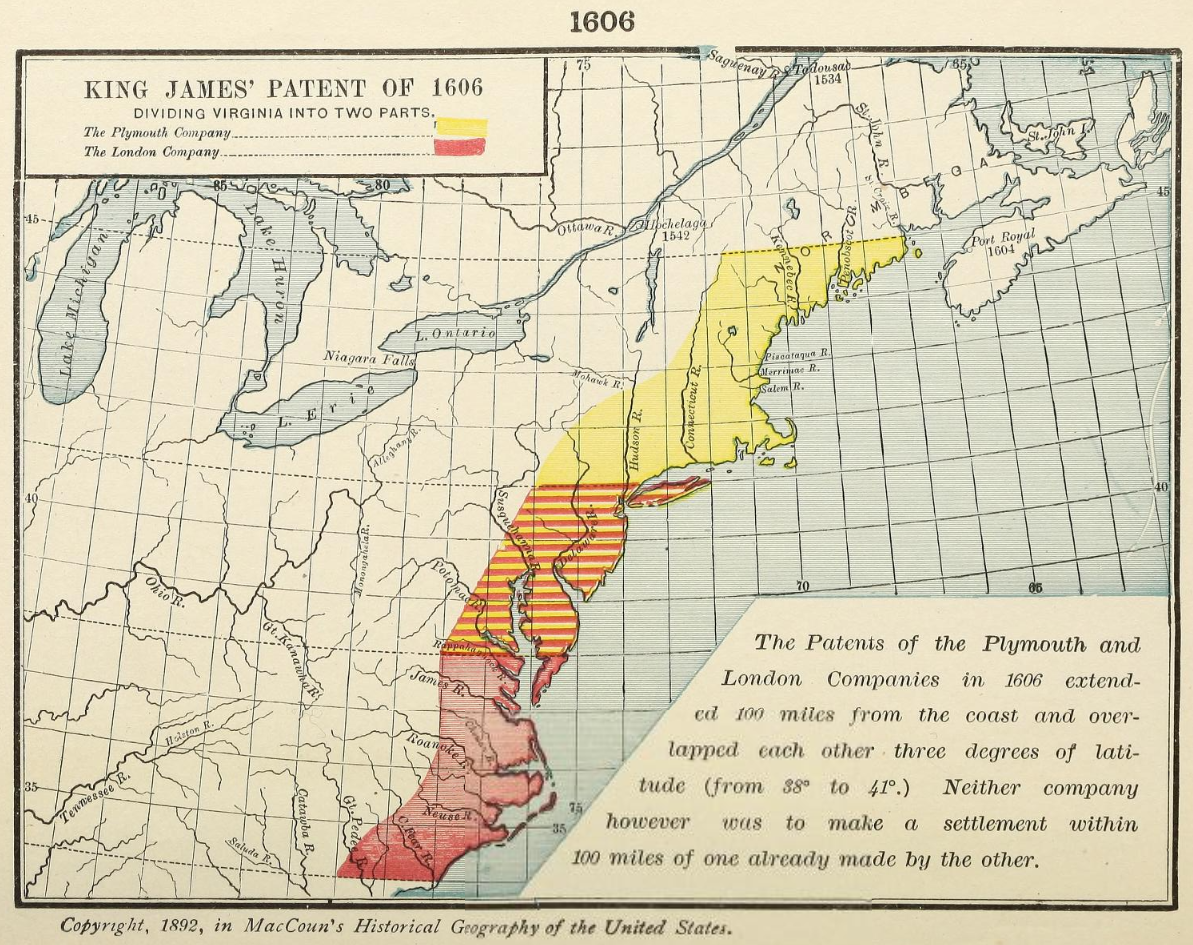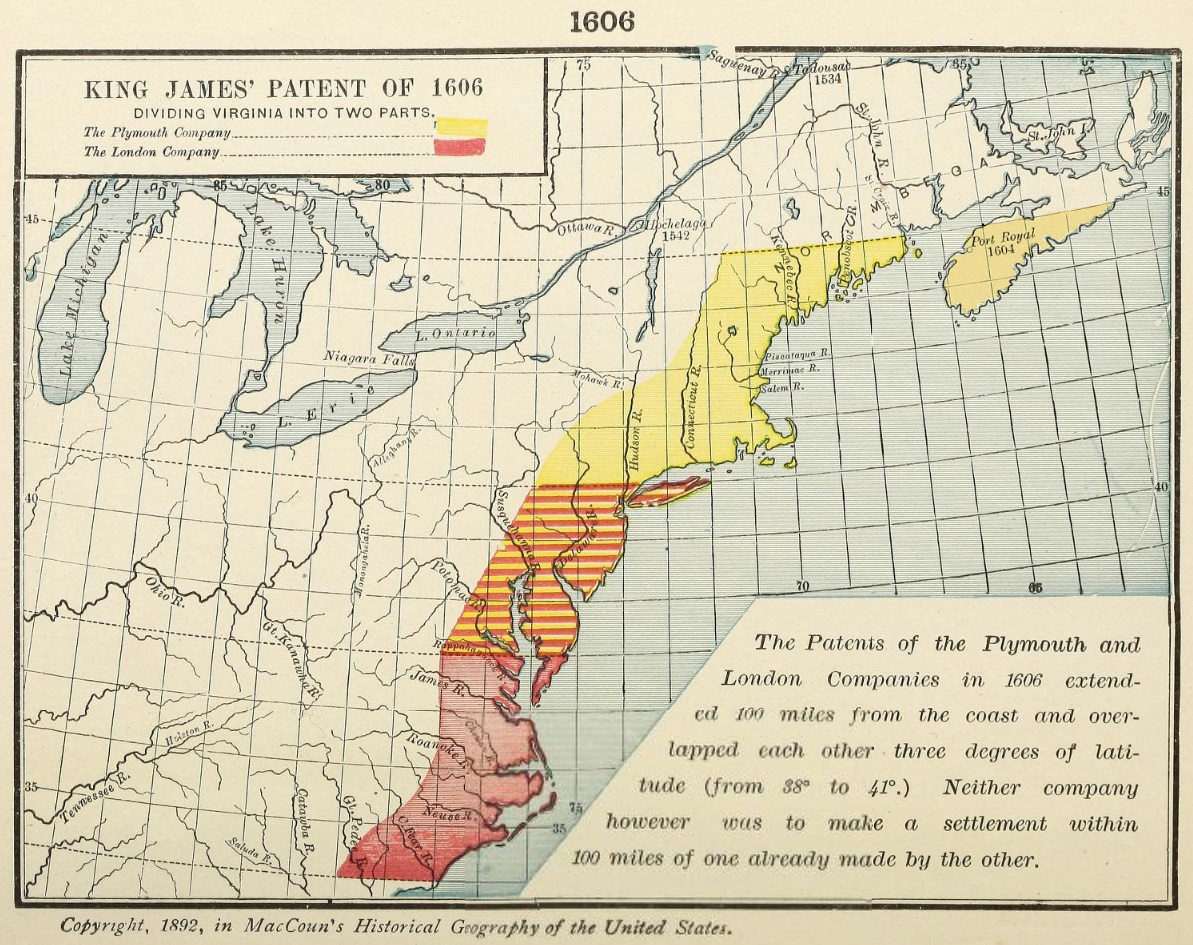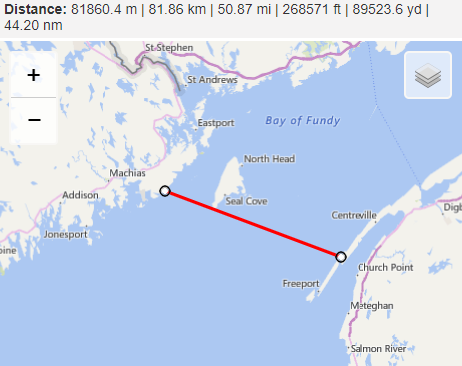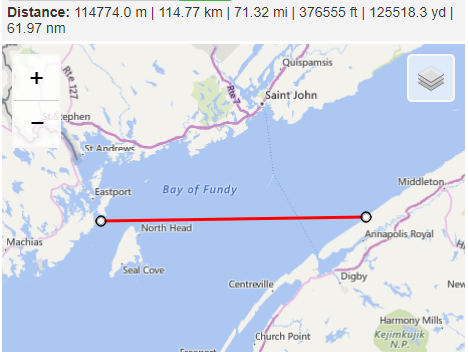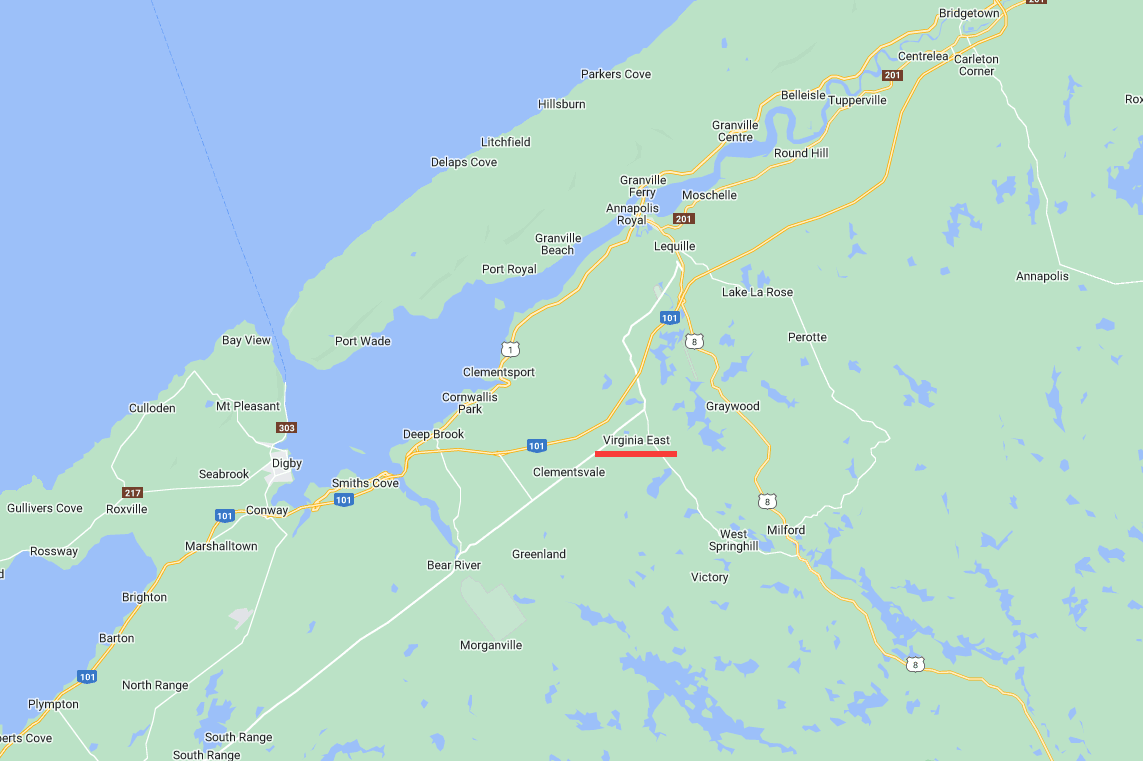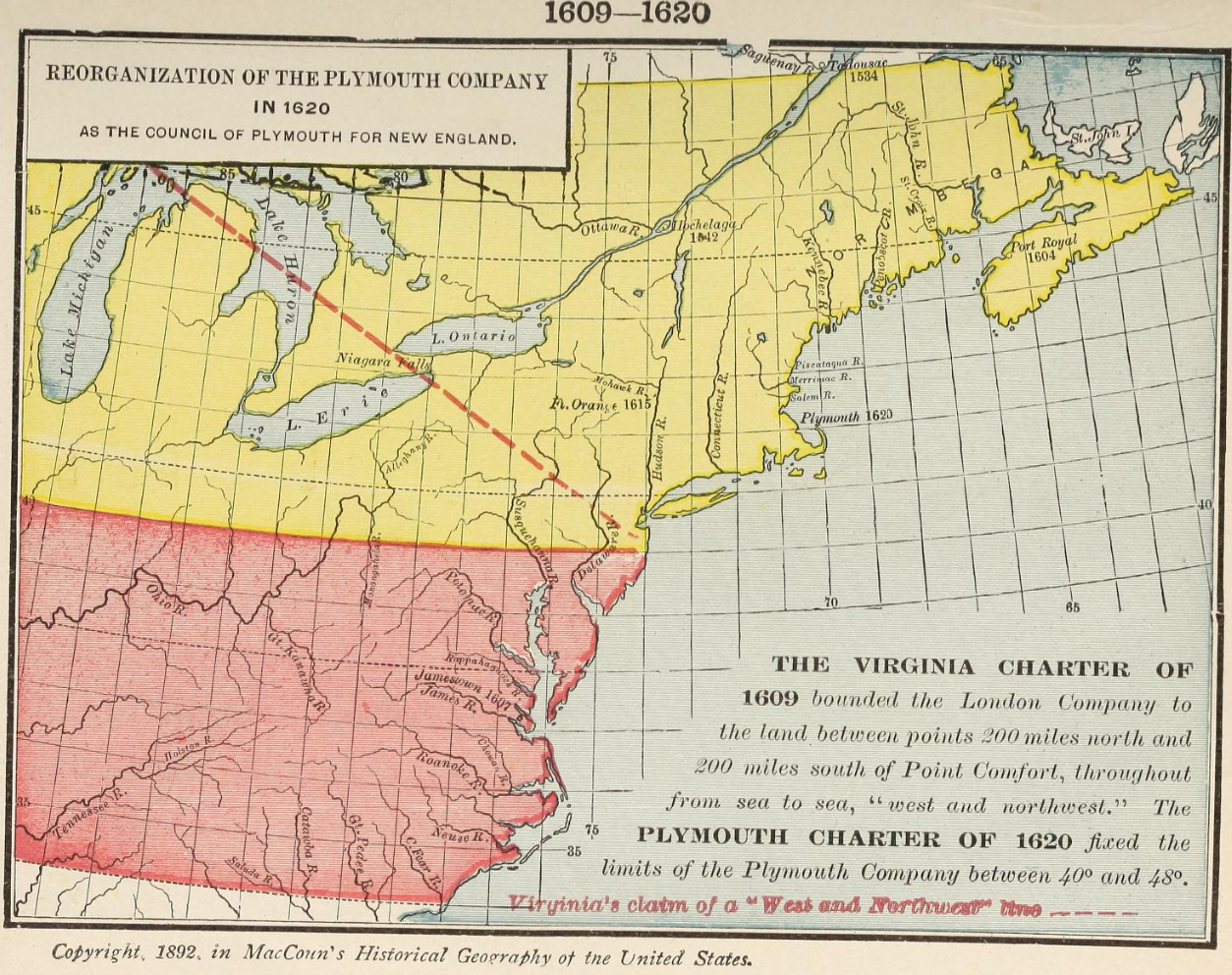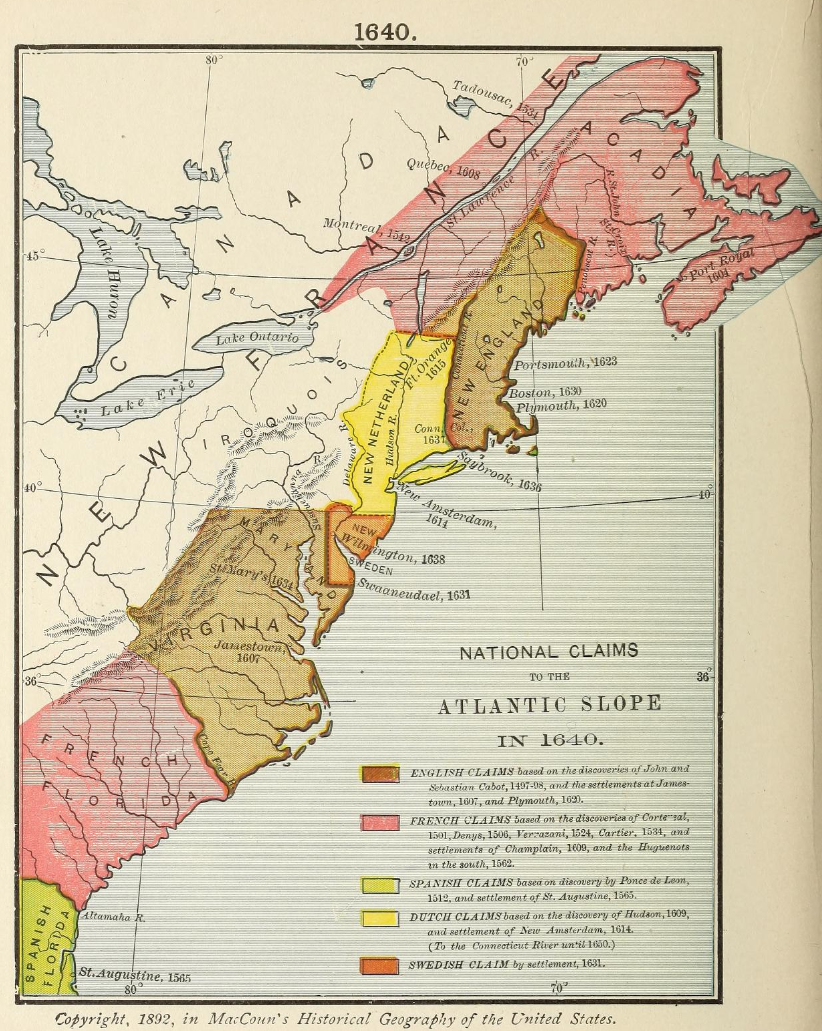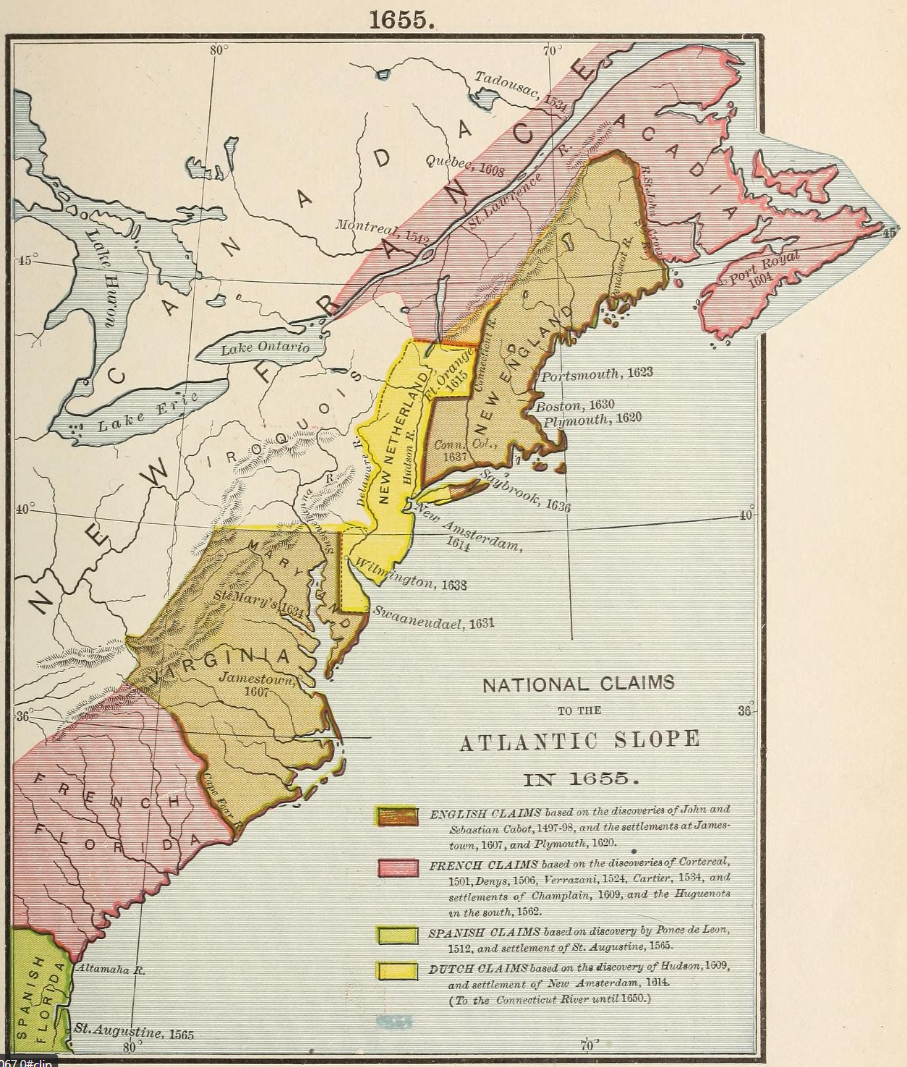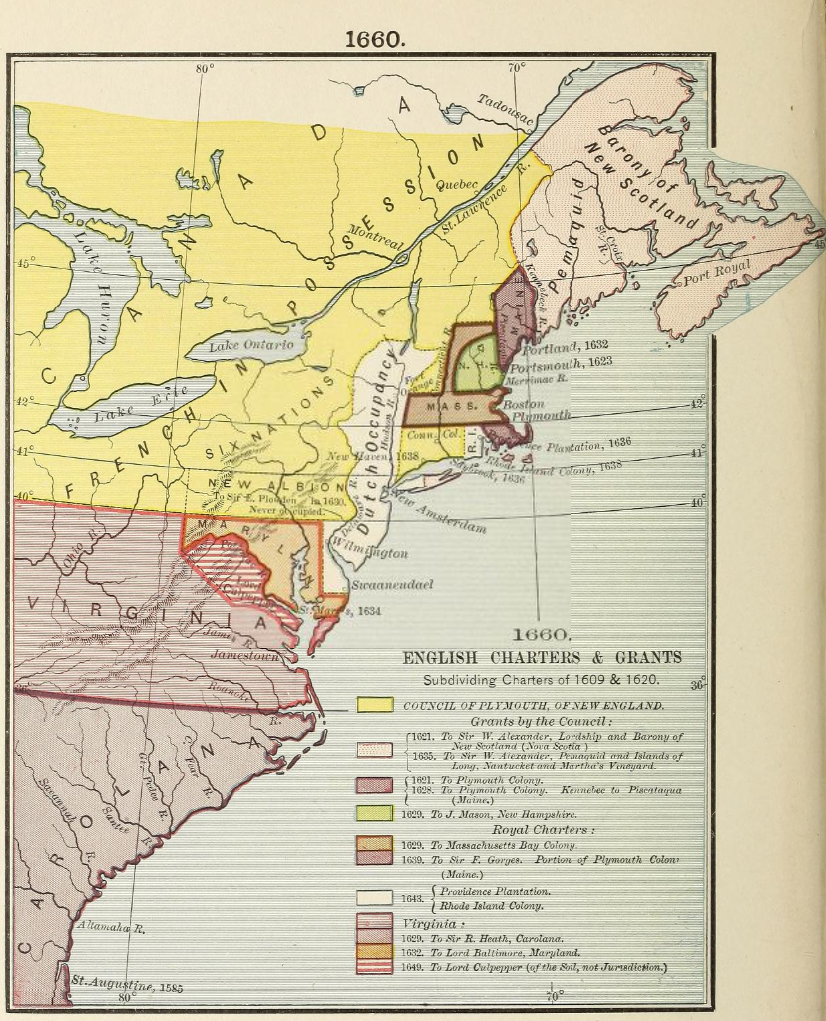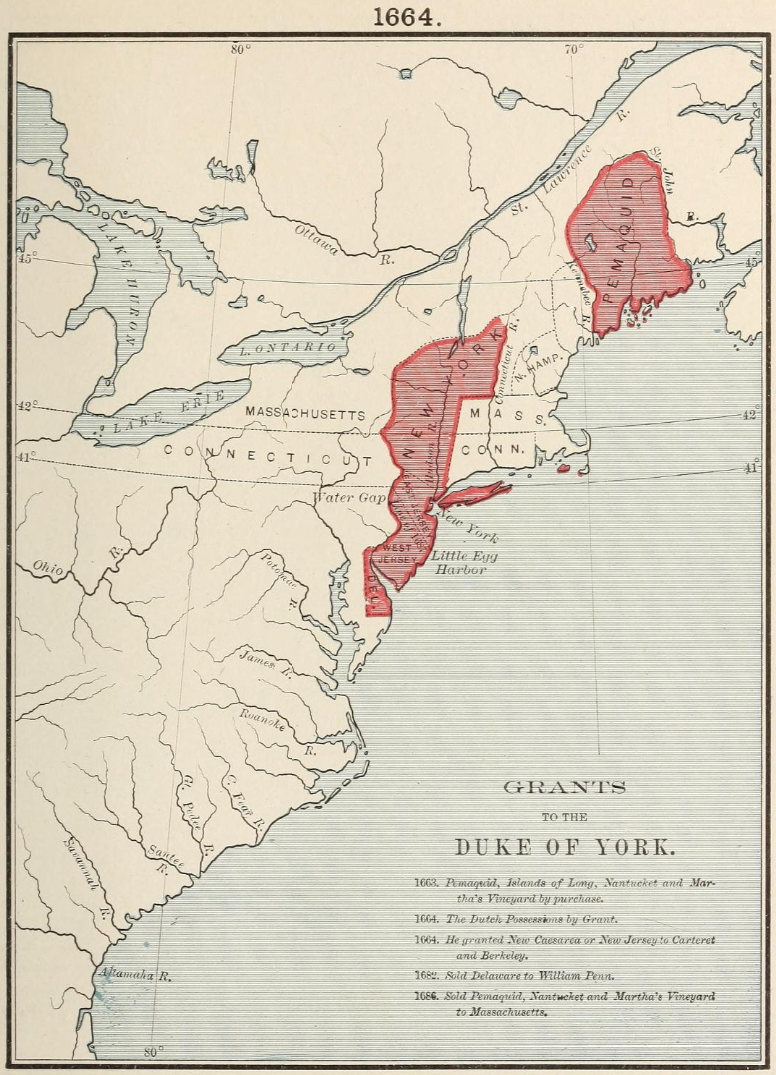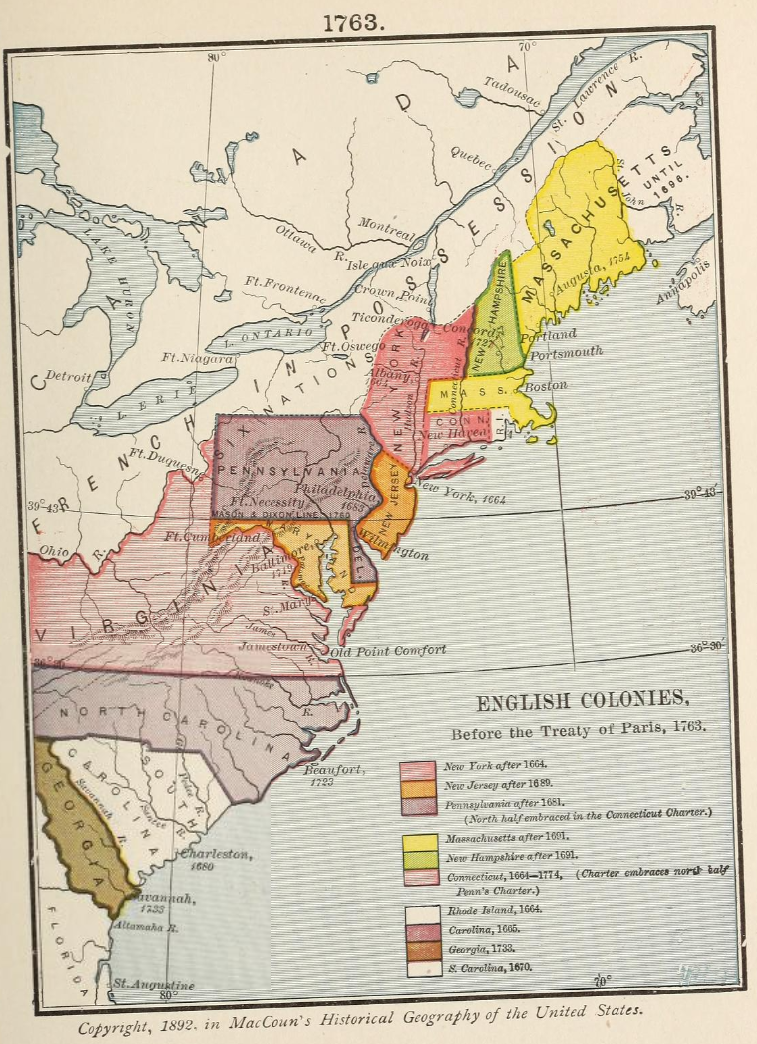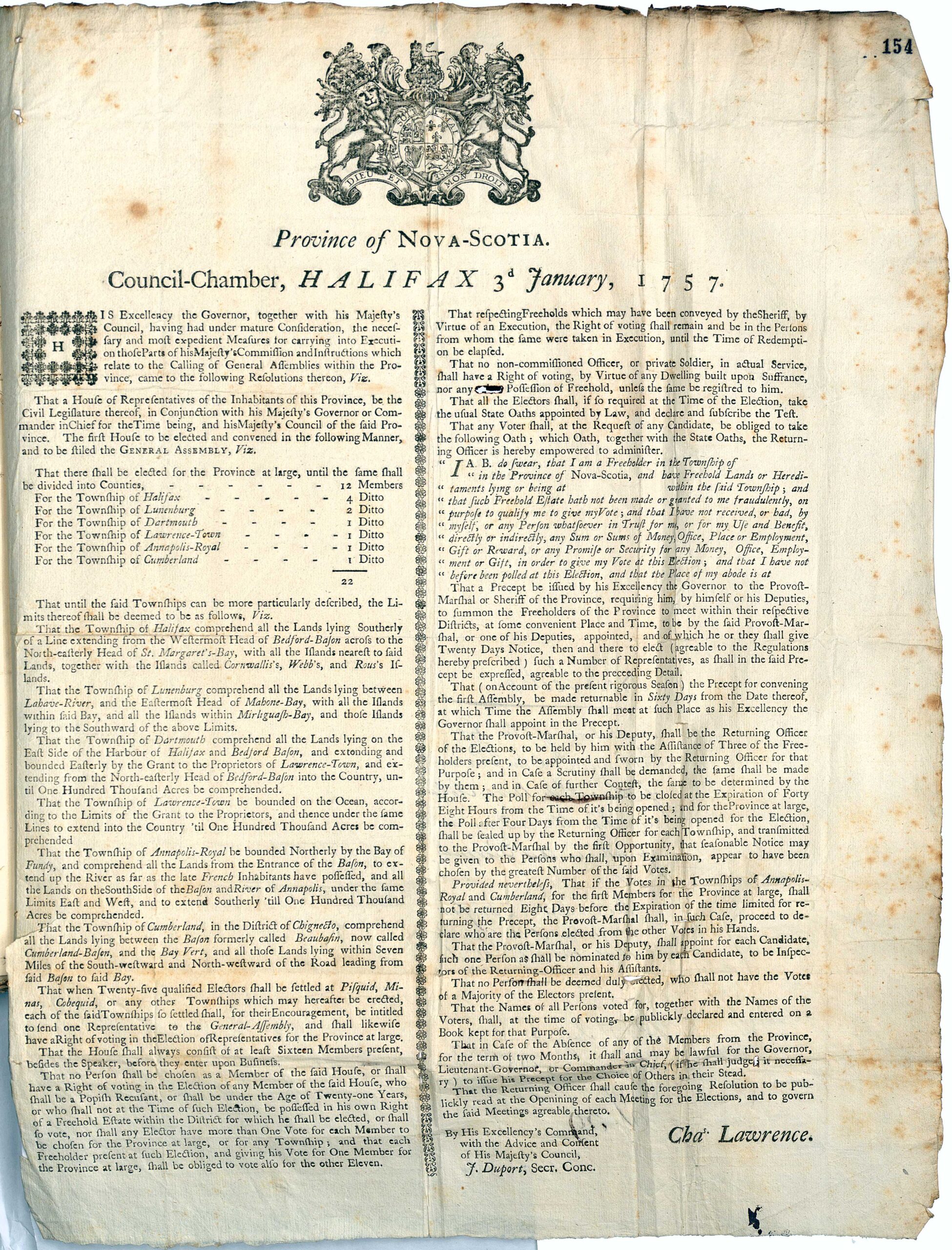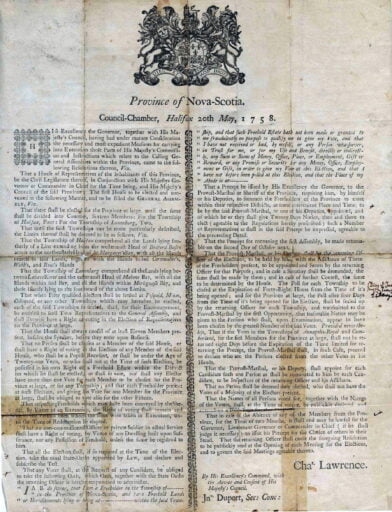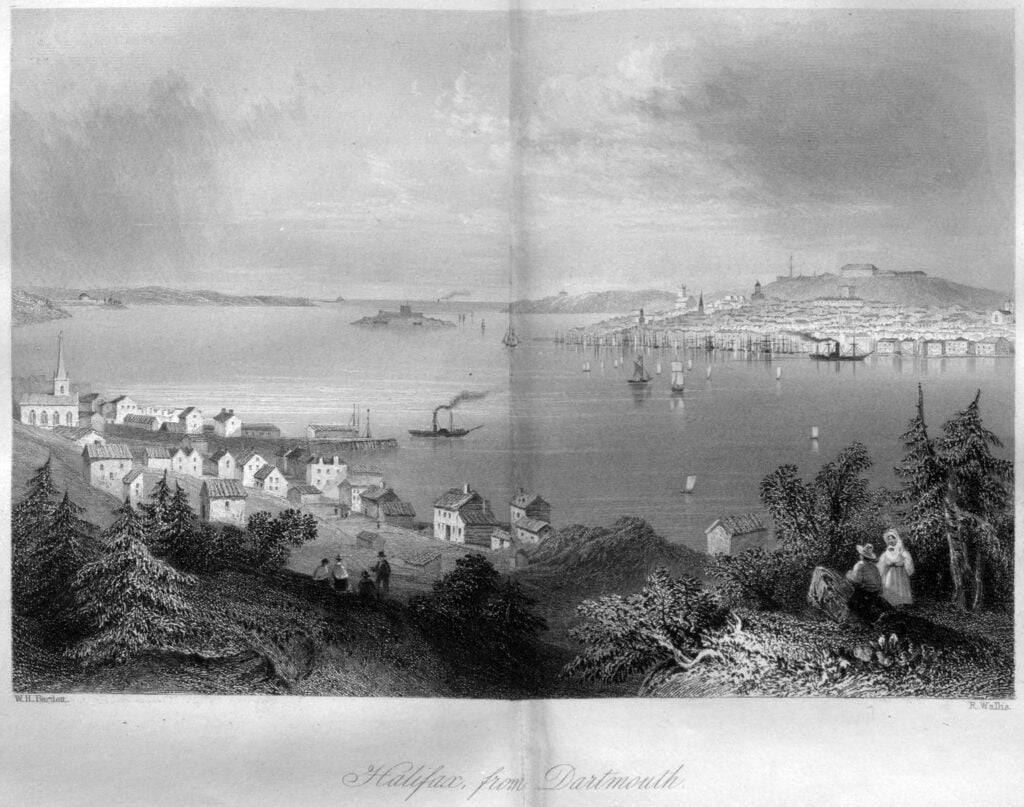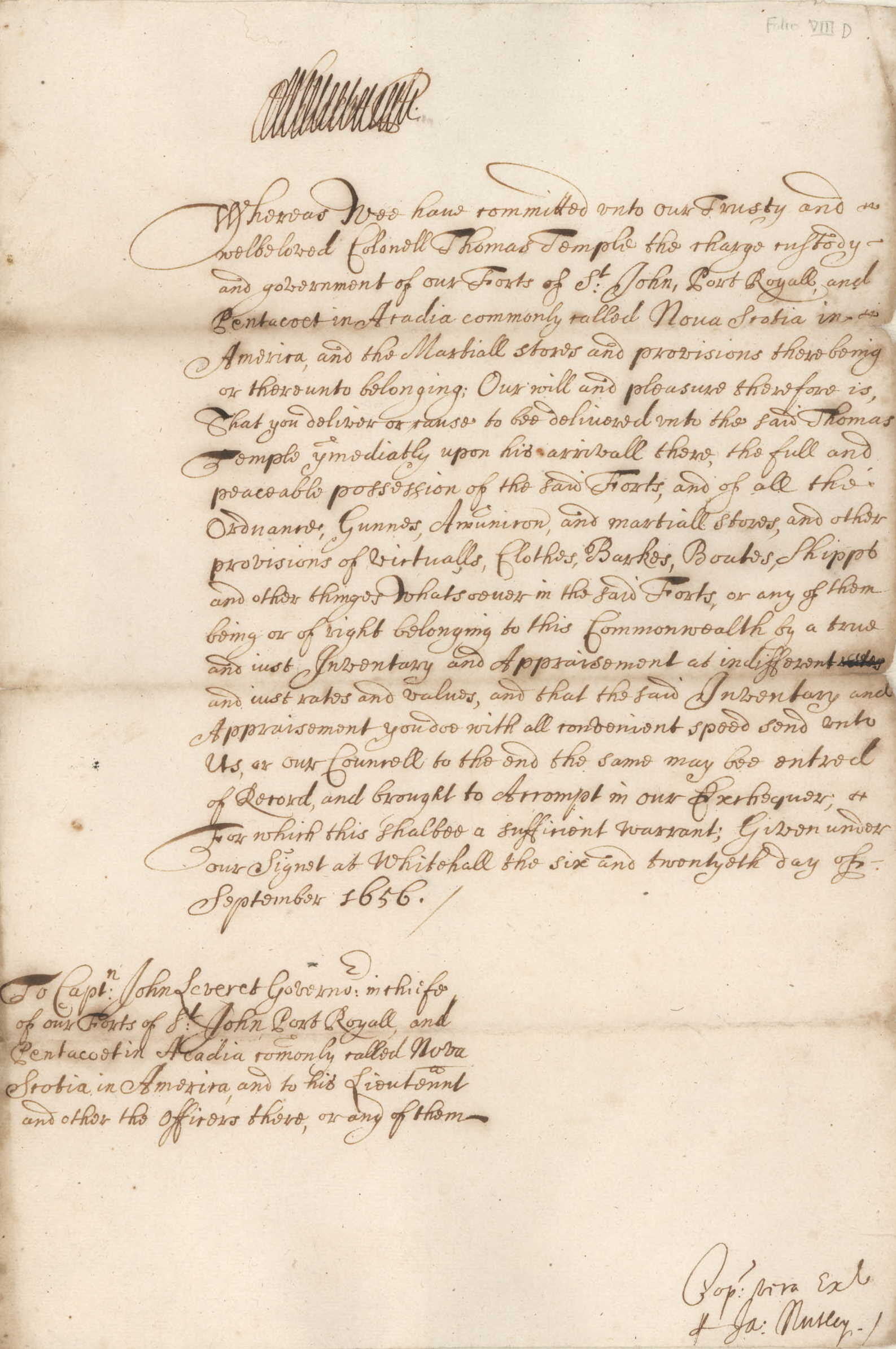Extracts From The Patent Of Acadia to De Monts By Henry IV of France, November 8/18, 1603.
Henery by the grace of God Kinge of ffrance and Navarre. To our cleare and welbeloved the Lord of Monts, one of the Ordinary Gentlemen of our Chamber, greetinge. As our greatest care and labour is, and hath alwaies beene, since our cominge to this Crowne, to maintaine and conserueitin the anntient dignity, greatnes and splendour thereof, to extend and amplifie, as much as lawfully may bee done, the bounds and limitts of the same. Wee beinge of a long time informed of the situacon and condicon of the lands and territories of La Cadia, moved above all thinges with a singuler zeale, and devout and constant resolucon wch wee have taken with the helpe and assistance of God Authour Distributour and Protectour of all Kingdomes and estates to cause the people we doe inhabite the countrey, men at this piite time barbarous. Atheists without faith or religion, to be conuerted to Christianity, and to the beliefe and profession of our faith and religion, and to drawe them from the ignorance and vnbeliefe wherein they are, havinge also of a longe time knowen by the relagon of the Sea Captaines, Pylotts, Merchants and others, who of longe time have haunted, frequented, and trafficked with the people that are found in the said places, how fruitfull, commodious, and profitable may bee with vs, to our estates and subiects, the dwellinge possession and habitagon of those countries, for the great and apparant profit we may bee drawen by the greater frequenta9on and habitude wch may be had with the people that are found there, and the Trafficke and commerce wch may bee, by that means safely treated and negotiated. Wee then for these causes fully trustinge on your great wisedome, and in the knowledge and experience that you have of the qualitie, condicon and situation of the said countrie of La Cadia : for the divers and sundry navigarons, voyages, and frequentaoons that you have made into those parts and others neere and borderinge vpon it. Assuringe our selues that this our resolution and intention, beinge committed vnto you, you will attentively, diligently, and no less couragiously and valorously execute and bring to such perfeccon as wee desire : Have expressly appointed and established you, and by these presents signed with our owne hands, doe committ, ordaine, make, constitute and establish you, our Lievtenant generall, for to represent our person in the countries, territories, coasts, and confines of La Cadia. To begin from the 40 degree to the 46. And in the same distance, or part of it, as farre as may bee done, to establish, extend, and make to bee knovven our name, might and authoritie. And vnder the same to subiect, submitt and bringe to obedience all the people of the said land and the borderers thereof: And by the meanes thereof and all lawfull waies, to call, make, instruct, provoke and incite them to the knowledge of god, and to the light of the faith and Christian religion, to establish it there : And in the exercise and profession of the same, keepe and conserue the said people, and all other inhabitants in the said places, and there to commauud in peace, rest and tranquillity as well by sea, as by land: to ordaine, decide and cause to be executed all that wch you shall iudge fitt and necessary to bee done, for to maintaine, keepe and conserue the said places vnder our power & authority by the formes, waies and meanes prescribed by our lawes. And for to have there a care of the same with you to appoint, establish and constitute all Officers, as well in the atfaires of warre, as for Justice and policie, for the tirst time, and from thence forward to name and present them vnto vs, for to bee disposed by vs, and to give Ires, titles, and such provisoes, as shalbee necessarie. And accordinge to the occurrences of affaires your selfe with the aduice of wise, and capable men, to prescribe vnder our good pleasure, lawes, statutes, and ordinances conformable, asmuch as may be possible, vnto ours, specially in thinges and matters that are not provided by them. To treate and contract to the same effect, peace, alliance, and confederacy, good amity correspondency, and communicacon with the said people and their princes, or others, havinge power or commaund over them: To entertaine, keepe and carefully to obserue, the treatises, and alliances wherein you shall covenant with them; upon condicon that they themselves performe the same of their part. And for wont thereof to make open warre against them, to constraine and bring them to such reason as you shall think needful!, for the honour, obedience and service of god, and establishment, maintenance and conseruacon of our said authoritie amongst them: at least to haunt and frequent by you, and all our subiects with them, in all assurance, libertie, frequentacou, and communicacon there to negotiate and trafficke lovingly and peaceably. To give and graunt vnto them fovours, and priviledges, charges and honours, wth intire power abovesaid, we will likewise and ordaine, that you have over all our said subiects that will goe in that voyage with you and inhabite there, trafficke, negogiate and remaine in the said places, to retaine, take, leserue, and appropriate vnto you, what you will and shall see to bee most commodious for you, and proper for your charge, qualitie and vse of the said lands, to distribute such parts and porcons thereof, to give and attribute vnto them such titles, honors, rights, powers and faculties as you shall see necessary, accordinge to the qualities, condicons and meritts of the persons of the same Countric or others. Chiefly to populate, to manure, and to make the said lands to be inhabited as spedily, carefully, and skillfully, as time, places and commodities may permitt: To make thereof, or cause to be made to that end, discoverie and view alonge the maritime Coasts and other Countries of the maine land, wch you shall order and prescribe in the foresaid space of the 40 degree to the 46 degree or otherwise, asmuch and as farre as maybee alonge the said Coast, and in the firme land. To make carefully to be sovght and marked all sorts of mines of gold and siluer, copper, and other Metalls and Mineralls, to make them to be digged, drawne from the earth, purified, and refined for to bee conuerted into vse, to dispose accordinge as wee have prescribed by Edicts and orders, wch wee have made in this Realme of the profitt and benefitt of them, by you or them by whom you shall establish to that effect, reseruinge vnto vs only the tenth peny, of that wch shall issue from them of gold, silver and copper, leavingo vnto you that wch wee might take of the other said Metalls and Mineralls, for to aide and ease you in the great expenses that the foresaid charge may bringe vnto you;….
….And to the end no body may pretend cause of ignorance, of this our intention, and to busie himself in all, or in parte of the charge, dignitie, and authoritie wch wee give vnto you by these presents: We have of our certain knowledge, full power, and rogall authoritie, revoked, suppressed and declared voide, and of none ctlect hereafter and from the present and all other powers and Comissions, Itres and expedi^ons given and delivered to any person soeuer, for to discover, people and inhabite in the aforesaid extension of the said lands scituated from the said 40 degree to the 46, whatsoever they bee. And furthermore wee command and ordaine all our said officers of what qualitie and condi90u soever they bee, that after these pnts or the duplicate of them shallbee duely examined by one of our beloved and trustie Counsellors, Notaries, and Secretaries, or other Notarie Royall, they doe vpon our request, demaund, and sute, or vpon the sute of any our Atturneys, cause the same to be read, published, and recorded in the records of their iurisdic9ons, powers, and precincts, seekinge, as much as shall apperteine vnto them, to quiet and appease all troubles and hinderance wch may contradict the same. For such is our pleasure. Given at fountain-bleau the 8 day of November: in the yeare of our Lord 1603: And of our Raigne the 15. signed Henery : and vnderneath, by the Kinge, Potier ; And sealed upon single labell with yellow Avaxe.
Grant To Claude La Tour, By Sir William Alexander. April 30-May 10 1630.
In the name of God Amen know all those who these Lettrs Patients shall see or shall heare read, that vpon this present thirtie day of Aprill in the yeare of our Lord one thousand Sixe hundred and thirtie before me Josh Maynet Notary & Tabellion Royall dwelling in London Admitted and sworne by the Authoritie of or Souaihne Lord the King, & in the prince of the witnesses, herevnder named were present in pson My Lord Wm Allexauder Knight Lord of Menstrie & Cheife Secretary of State for the Kingdome of Scotland for his said Majesties ot great Bretany privy Counsellor of State, & Leiut vnto his said Majestie in New Scotland in America on the one pt who haueing by Lettrs Pattents, from his said majesties under the great scale of Scotland, the Donation of all the Said Countrey of New Scotland called by the french the Countrey of Accadye, in America, vnto him & his heyres in ffief & ppetuall inheritance, bearing date the tenth of the Moueth of September in the yeare One thousand Sixe hundred twentie & one, he hath out of the respect & amitie wch he beareth vnto St Claude de Sainct Estieune Knight Lord of La Tour & of Vuarre, & Vnto Charles de Sainct Estienne Esqr Lord of Samt Denicourt his Sonne on the other pt the Said St Claude de St Estienne being present accepting & by these presents Stipulating for his Said Sonne Charles being absent & for their heyres, & as well for the merit of their psons & for theire assistance to the better discovery of the said Countrey, & vpon other consideracons, the said Lord Allexander hath giuen & by these p^uts, franckely & freely doth giue vnto the said Knight de La Tour & vnto his said Sonne & vnto theire heyers, they seeing Cause ppetually & for euer to dispose of as of theire owne proprietie, true & Loyall acquest, & Conquest all the Country Coasts & Islands, from the Cape & River of Ingogon nere vnto the Cloven Cape in the said New Scotland
Called the Countrey & Coast of Accadye, following the Coast & Islands of the said Countrey towards the East vnto Port de La Tour formerly named L’omeroy & further beyond the said Port following along the said Coast vnto Mirliquesche nere vnto & beyond the Port & Cape of L Heue drawing forward fifteene leagues within the Said Lands towards the North, of all the wch said lands & seas the said Knight de la Tour & his sonne shall receiue all the fruicts, profits emoluments that may provene generally and whatsoeuer as of theire owne proper & loyall acquest in all right & Jurisdiccon & priviledges whatsoeur as much or more then any Marquis, Earle or Baron holds or rayseth from the Crowne of Scotland, according to the Lawes or Lettrs Pattents vnto the said Lord Allexander, & vnto them graunted by the Kings of Scotland, within the wch Countrey, Lands & seas aboue named, they may make build & erect villages, Townes, & Castles & fortresses as they shall see good, wch said Knight de La Tour, and his said Sonne shall hold & enjoye, all the said Countrey here aboue Avithin the said Limitts named from the King & the succession of the said Crowne of Scotland in tfief &, title of honnor & right of inheritance with the said Sr Wm Alexander to them by vertue of the power to him by the said Pattents giuen hath erected and entitled by two Barronnies, namely the Baronny of Sainct Estienne & the Baronny of de La Toure, wch may be Limitted & bounded equally betweene the said Knight de La Tour & his Said Sonne, if they shall see cause, vpon Condition that the said Knight de la Tour, & his said sonne, as he hath pmissed & for his Said Sonne by these profits doth gmisse to be good & faithful Vassalls of the said Sovraigne Lord the King of Scotland & theire heyres and successors, & to giue vnto him all obedjence & assistance to the reduceing of the people of the said Countrey & to entertaine good
Amitie & Correspondency with the said Lord Alexander & his heyres, and all his subjects wch there shall be planted & resident, & shall maintaine good & faithfull Societie & Vnion & the respect due vnto the said Lord Alexander as vnto the Leiut of the King, the said Lord Alexander gmissing also on his part Amitie Societie Correspondency assistance & protection from his said Majesties & from him selfe his Leiu flurthermore & over & abone the said Lord Allexander graunteth vnto the said Knight de La Tour & vnto his said Sonne & vnto theire heyres & successors & Assignes for euer the right of Admiraltie in all the extent of theire said Lands & Limitts The said Lord Allexander & Knight de La Tour to hold & fullfill the Contents of what is aboue, without euer in any sort whatsoeuer violating thereof vpon the obliging of all theire goods profit & to come &, vpon the pgenaltie of the Ordinances appointed by the Lawes Established on the one pt & the other to the violation hereof, the said Lord Allexander pmissing over & aboue to make or Cause to be made more ample Writing in good & due forme, according and Conformably vnto the said Lettrs Patients vnto him graunted by his said Majesties whereof a Coppie Collationed with the Originall shall be giuen vnto the Said Knight de La Tour & his said Sonne & the said Lord Allexander shall cause these profits to be agreed vnto, & ratifyed by his said Majesties vnder the great Seale of Scotland, it need shall require, in witnes of the truth hereof there are two writtings of the same tenor made & jndented wch each ptie hath respectiuely signed sealed & delivered, this made & passed in Martins Lane nere vnto this Cittie of London in the princee of sr Allexander Strachan Baronet of Thornton, George Angush Peter James & Kich’ Grimes witnesses herevnto Called & admitted
Signed W Alexander a litle seale
Concession of the River and Bay of St. Croix to Commander Razilly, by the Company of New France. May 14/24, 1632.
La Compagnie de la Nouvelle France : A tous ceux qui ces preseutes lettres verront ; Salut. Le desir que nous avons d’aporter toute la diligence possible a I’etablissement de la colonic de la Nouvelle France, nous faisant rechercher ceux qui ont la volonte d’y coutribuer de leur part, & I’obligation que nous avons de recompenser, par toutes voies, les travaux de ceux qui nous assistent, & d’embrasser les occasions de leur temoiguer par effets, etant bien informe des bonnes intentions que Monsieur le Commandeur de Razilly, Lieutenant general pour le Roi en la Nouvelle France, a toujours eu pour faire reussir cette enterprise, en desirant Ten reconnoitre par les gratifications a nous possibles. A ces causes avons audit sieur de Razilly donne & octroj^e, donnons & octroyons par ces presentes, I’etendiie des terres & pays qui ensuivent, a sgavoir la riviere & bale SainteCroix, isles y contenues, & terres adjacentes d’une part & d’autre en la Nouvelle France, de I’etendiie de douze lieiies de larges, a prendre le point milieu en I’isle Sainte-Croix, ou le sieur de Mons a hiverne, & vingt lieiies de profondeur depuis le port aux coquilles, qui est e I’une des isles de Ten tree de la riviere & bale Sainte-Croix, chaque lieiies de quatre mille toises de long. Pour jouir desdits lieux par ledit sieur de Razilly, ses successeurs ay ant cause, en toute
propriete justice & seigueurie a perpetuite, tout & ainsi, & a pareils droits qu’ il a plu au Roi donner le pays de la Nouvelle France a la Compaguie ; a la reserve de la foi & houimage que ledit sieur Commaiideur, ses successeurs ayans cause, seront tenus porter au fort Saint-Louis a Quebec, ou autre lieu qui sera destine par ladite Compagnie, par un seul hommage tige a chaque mutation de possesseur desdits lieux avec une maille d’or du poids d’une once, & le revenu d’une annee de ce que ledit sieur Commandeur se sera reserve, apres avoir donue a fief ou a cens & rente, tout ou partie desdits lieux ; que les appellations du juge qui sera etabli desdits lieux par ledit sieur de Razilly, resortiront nuemeut a la cour & justice souveraine qui sera etabli ci apres au fault Saint-Louis ou ailleurs ; que les hommes que ledit sieur Commandeur fera passer en la Nouvelle France tourneront a la decharge & diminution du nombre de ceux que la Compagnie doit laire passer, sans que ledit sieur Commandeur ou les siens puissent traiter des peaux & pelleteries qu’ aux conditions portes par I’edit de I’etablissement de la Compagnie de la Nouvelle France ; & en cas que ledit sieur Commandeur desire faire porter a cette etendiie de terre quelque nom & titre plus honorable, se retirera vers le Roi & Monseigneur le Cardinal de Richelieu, Grand-Maitre, Chef & Surintendant general de la navigation & commerce de France, pour lui etre pourvii conformement aux articles accordes a ladite Compagnie. En temoin de quoi nous avons signe ces presentes. A Paris, au Bureau de la Nouvelle France, le dixneuvieme mai mil six cent trente-deux. Signe Lamy avec par araphe Secretaire.
The Company of New France: To all those who will see these previous letters; Hi. The desire we have to bring all possible diligence to the establishment of the colony of New France, making us seek out those who are willing to contribute their share, and the obligation we have to reward, by all means, the work of those who assist us, & to embrace the opportunities to testify to them in effect, being well informed of the good intentions that Mr. Commander de Razilly, Lieutenant General for the King in New France, has always had to make this enterprise a success, wishing to recognize it through the gratifications available to us. For these reasons we have hereby given and granted to the said sieur de Razilly, the extent of the lands and countries which follow, namely the river and the Sainte-Croix base, the islands contained therein, and adjacent lands on the one hand & on the other in New France, from the extent of twelve leagues wide, to take the midpoint in the island of Sainte-Croix, where the Sieur de Mons wintered, and twenty leagues deep from the shell port , which is one of the Ten Tree Islands of the Sainte-Croix River and Base, each island four thousand toises long. To enjoy the said places by the said sieur de Razilly, his successors having cause, in all
property justice & serieury in perpetuity, everything & so, & with the same rights that the King was pleased to give the country of New France to the Company; with the reservation of the faith & houimage that the said sir Commander, his successors having cause, will be required to bring to Fort Saint-Louis in Quebec, or other place which will be destined by the said Company, by a single homage owed to each transfer of possessor of the said places with a link of gold weighing one ounce, & the income of one year of what the said sir Commander will have reserved for himself, after having given to fief or to cens & rent, all or part of the said places; that the appellations of the judge who will be established from the said places by the said sieur de Razilly, will fall entirely to the sovereign court and justice which will be established hereafter in Saint-Louis or elsewhere; that the men that the said Mr. Commander will send to New France will turn into landfill and a reduction in the number of those that the Company must pass through, without the said Mr. Commander or his people being able to process skins and furs except under the conditions stipulated by the edict of the establishment of the Company of New France; & in the event that the said sir Commander wishes to give this expanse of land some more honorable name & title, will retire to the King & Monseigneur the Cardinal de Richelieu, Grand Master, Chief & General Superintendent of navigation & commerce of France, to be provided to him in accordance with the articles granted to the said Company. In witness whereof we have signed these presents. In Paris, at the Bureau de la Nouvelle France, May 19, one thousand six hundred and thirty-two. Lamy sign with Secretaire initials.
Concession of Acadia to Sir Charles La Tour, By The Company of New France. January 15/25, 1635/6.
La Compagnie de la Nouvelle France: A tous ceux qui ces presentes lettres verront, Salut. Le desir que nous avons d’ accroitre la colonic de la Nouvelle France, nous faisant recevoir ceux qui nous peuvent aider en ce loiiable dessein; & voulant les inciter d’ avantage, en les gratifiant de quelques portions de terres a nous concedees par le Roi, apres avoir ete certifies des bonnes intentions de Charles de SaintEtienne sieur de la Tour, Lieutenant General pour le Roi es cotes de l’Acadie en la Nouvelle France, nomme par Monseigneur le Cardinal Due de Richelieu, Pair de France, Grand-Maitre, Chef & Surintendant general de la naviofation & commerce de ce Royaume, sur la presentation de ladite Conipagnie, & avoir leconnu Ie zele dudit sieur de la Tour a la Reliirion Catholique, Apostolique & Romaine, & au service de Sa Majestd, avons donne & octroye, donnons & octroyons par ces presentes, eu vertu du pouvoir a nous donnd par Sa Majesty, le fort & habitation de la Tour, situe en la riviere Saint-Jean en la Nouvelle France, entre les 45 & 46, degrees de latitude, ensemble des terres prochainenient adjacentes Ti icelui dans I’dtcndiie de cinq lieiies au dessous le long dc ladite riviere, sur dix lieiies de profondeur dans les terres : le tout selon les bornes qui en seront assignees, pour en jouir par ledit sieur de la Tour, ses successeurs ou ayans cause, en toute propriete, justice & seigneurie, & tout ainsi qu’ il a pIu au Roi donner & conceder ledit pays de la Nouvelle France en notredite Compagnie; tenir le tout en fief mouvant & relevant de Quebec, ou autre lieu qui sera ci-apres designd par ladite Compagnie, a la charge de la foi & homniage que ledit sieur de la Tour, ses successeurs ou ayans cause seront tenus de porter audit fort de Quebec ou ailleurs, & de payer les droits & profits de fiefs, ainsi qu’il se pratique aux mutations de personnes ; & que ledit sieur de la Tour, ses successeurs ou ayans cause ne pourront faire cession ou transport de tout ou de partie des choses ci-dessus a lui concedees pendant dix ans, a compter du jour & date des presentes, sans le gre & le consentement de ladite Compagnie ; & apres dix ans il lui sera loisible, a ses successeurs ou ayans cause, d’en disposer avee les niemes charges ci-dessus, au profit des personnes capable, & faisant profession de la Religion Catholique. Apostolique & Romaine. Fait & aecorde le quinziemme Janvier mil six cent trente-cinq.
Extrait des deliberations de la Compagnie de la Nouvelle France. Si’jue A. Cheffault avee paraphe.
The Company of New France: To all those who see these present letters, Hello. The desire we have to increase the colony of New France, allowing us to receive those who can help us in this lawful purpose; & wanting to encourage them further, by rewarding them with some portions of land granted to us by the King, after having been certified of the good intentions of Charles de Saint-Etienne sieur de la Tour, Lieutenant General for the King on the coast of Acadia in New France, appointed by Monsignor Cardinal Due de Richelieu, Peer of France, Grand Master, Chief & General Superintendent of shipping & commerce of this Kingdom, on the presentation of the said Conipagnie, & having recognized the zeal of the said sir of the Tower to the Catholic, Apostolic & Roman Reliirion, & in the service of His Majesty, we have given & granted, let us give & grant by these presents, by virtue of the power given to us by His Majesty, the fort & habitation of the Tower, located in the Saint-Jean River in New France, between 45 and 46 degrees of latitude, all the lands next adjacent to it in the distance of five leagues below along the said river, on ten leagues of depth in the lands: all according to the limits which will be assigned, to be enjoyed by the said sieur de la Tour, his successors or those having cause, in complete ownership, justice & lordship, & all as the King was able to give & concede the said country of New France in our said Company; hold the whole in moving fief and depending on Quebec, or other place which will hereinafter be designated by the said Company, in charge of the faith and homage which the said sieur de la Tour, his successors or successors in cause will be required to bear to said fort from Quebec or elsewhere, & to pay the rights & profits of fiefs, as is done for transfers of people; & that the said sieur de la Tour, his successors or assigns may not transfer or transfer all or part of the above things granted to him for ten years, from the day and date hereof, without the will and the consent consent of the said Company; & after ten years it will be open to him, to his successors or those having cause, to dispose of it with the same charges above, for the benefit of capable people, & professing the Catholic Religion. Apostolic & Roman. Done and agreed on the fifteenth day of January one thousand six hundred and thirty-five.
Extract from the deliberations of the Compagnie de la Nouvelle France. Si’jue A. Cheffault with initials.
Commission To Lord D’Aulney Charnizay, By Louis XIV of France. February, 1647/8.
Lewis by the Grace or God King of France & Navarr to all People present and to com greeting. Being well informed & assured of the laudable & commendable aflection, trouble & diligence that our dear and well beloved Charles de Menou Knight Lord d’Aunay Charnisay apointed by the late King of blessed memory our most honoured Lord & Father (whom God absolve) Gouvernor and our Lieutenant General in the Country & Caost of La Cadie in New France hath used both to the conversion of the Savages in the said Country to the Christian Religion and Faith, and the establishing of our authority in all the extent of the said Country, having built a Seminary under the direction of a good number of Capucine Friars for the instruction of the Said Savages’s Children, and by his care and courage driven the Forein Protestants out of the Pentegoet Fort which They had seized to the preiudice of the rights and authority of our Crown, & hy our oxpres commandment taken again by force of arms, and put again under our power the Fort of the River Saint John which Charles of Saint Etienne Lord de la Tour was possessed of, and by open rebellion endeavoured to keep against our will and to the great contempt of the declarations of our Council by the help and countenance of Forein Protestants with whom he had made a confederacy for that purpose, and that moreover the said Lord d’Aunay Charnizay hath happily began to form and settle a French Colony in the said Country, cleared and improuved great parcels of lands, and for the defence and conservation of the said Country, under our authority and power built and strenuously Kept against the endeavours and assaults of the said Forein Protestants four Forts in the most necessary places, and them furnished with a sufficient number of Soldiers, sixty great guns & other things requisit to that, all with great & immense charges, the which to bear he hath been forced to borrow of severall persons great sums of money, we not having been able to give him all the assistance in that occasion that we had given, if the necessity of our affairs had permitted Us. Make Known that we desire with all our heart for the glory of God the encreasing of the Christian Faith and Relligion the Salvation of those poor Savages’s Souls, who live in ignorance without any Religion & knowledge of our Maker, as also for the honour and greatness of our Crown that so pious and honorable a work be carried on and finished as perfectly as possible, fully trusting in and assured of the zeal care industry courage good & wise behaviour of the said d’Aunay Charnizay, & being willing, as it is but reasonnable to reward his good and faithfull services, have by the advice of the Quen Regent our most honoured Lady and Mother, and with certain knowledge full power and Royall Authority the said Lord d’Aunay Chavnizay confirmed, and do confirm a new as much as need is or might be, and have apointed and do apoint by these presents signed by our own hand Gouvernor and our Lieutenant General representing our Person in all the above said Countrys Territorys Caosts and bounds of i’Acadie, beginning from the brink of the great River Saint Laurens, both along the Sea-caost and adiacent jslands, and innerpart of the main Land, and in that extent as much and as far as can be as far as the Virginias,1 to settle and make known our name, power and Authority and submitt to it the People that dwell there, to bring them and cause Them to be instructed in the knowledge of the true God and light of the Christian Relligion and Faith, and command there upon the sea as well as upon the Land, to order and put in execution all that he knoweth that can and ought to be done for the maintaining and keeping the said places under our Authority and Power, with power to appoint and settle all Officers both Civil & Military for the first time, and afterwards name Them to us and present Them for our confirmation and to give Them our Letters to that necessary : and according to the occurrences of aflairs with the advice & concill of the wisest and ablest persons make laws statutes and ordinances conform to ours as much as it is possible, make peace, alliance & confederacy with the said People Their Princes & others having power & commandment over Them, to make open war against Them, to establish and maintain our Authority and the freedom of trade and conunerce between our Sublets and Them and in other cases as he will think fit, to grant our said Subiects who may live and trade in the said Country et to the Natives thereof privileges places & dignitys according [to] the qualitys & merits of Persons, all under our good pleasure. We do will that the said d’Aunay Charnizay may and We (x’wc him power to keep and appropriate to himself what he will think most convenient & proper to his Settlement and use of the said Countrys and places, and to distribute such parts thereof as he pleaseth both to our said Sublets that will settle there, and to the Natives, and to grant them such titles, honours, rights powers & facultys as he will think fit, according [to] the qualitys, merits & services of Persons ; to cause the mines of gold silver, copper & other metals and minerals to be carefully Sought after and to put them in use as it is prescribed by our declarations. We reserve only the tenth part to our selves of the protit arising of the gold silver & copper ories and leave to him what might belong to us as to the other metals & minerals to help him to bear the other expences of his Gouvernement. We do grant to the said Lord d’Aunay Charnizay leave to build Towns, Forts harbours & other places that he thinketh to be usefuU for ye above mentioned purposes, and there to Set such Officers & garrisons as need shall be, and generaly to do for the settlement habitation & conservation ot the said Countrys, Lands & Coasts of I’Acadie from the said River S. Lawrens as far as the Virgines, their appartenances & dependences under our name & authority all that we could do our selves if we were there in person, giving him to that end all power & authority & special commission by these presents. Et for as much that the only way that he hath hitherto had & hath now and may have for the time to come, to bear part of the great charges that he hath been and is still at the said Lord d’Aunay Charnizay, for the keeping both of the said four Forts and garrisons there, and the Colony that is forming there and the Friars and Seminary abovesaid, all which things are maintained and do subsist at his own charge & cost, no body else having contributed to it any thing, is the trade and trafSck of furs with the said Savages, without which he could not maintain himself and would be fain’ to leave and abandon all to the preiudice of God’s honor and our Crown’s and the Savages’s souls who have already embraced Christianity, We have graciously given and granted to the said Lord d’Aunay Charnizay exclusively of all Others and by these presents do give and grant in confii’ming his actual possession of the same the privilege power & faculty to trafick & trade in furs with the said Savages throughout the said Country of main Land and caost of I’Acadie from the River Saint Lawrens to the Sea, and as far as the said Countris & Caost may be extended to the Virginias, to possess it as well as the lands, gold silver & copper mines and other metals & minerals, and all other things above mentioned himself, his heirs & assigns and make homage of them to us either in person or by an Atorney considering the distance of the places and the danger by reason of his absence ; to cause the said trade of furs to be menaged by Those he will appoint, and give power to do it. We do expresly forbid all merchants masters & Captains of ships and others our Sublets and the Natives of the said Country of whatsoever condition & quality They be to trade in the said furrs with the said jndians without his special leave and permission on pain of disobedience and entire confiscation of Their vessels, victuals arms, munitions and goods for the said Lord d’Aunay Charnizay and thirty thousand livers [livres] of fine. We do permit the Lord d’Aunay Charnizay to hinder Them by all means, to stop the Offenders, Their Vessels arms and victuals, in order to deliver them into the hand of justice, to be proceeded against the persons and goods of the said Offenders And in order that our intention and will be known and no body may plead ignorance, we command all our justices and officers every one in his place that at the request of the said Lord d’Aunay Charnizay They shall cause these presents to
be read published et registered, and what is contained in them to be kept and observed pounctually, causing to be posted up the contents Thereof in the seaports havens and other places of our Kingdom Lands & Countrys of our Dominions where need shall be, willing that credit be given to the coppys well collated by one of our beloved & faithfull Councellors & Secretarys or Notary Royall required to do it as to the present original. For such is our pleasure, jn witness whereof we have caused our seal to be set to these presents. Given at Paris in the month of February in the year of grace thousand six hundred forty seven, and the fourth of our reign
Signed
Lewis & lower By the King the Queen Regent his Mother being present De Lomenie.
1 A word formerly used to denote New England as well as more southern colonies.
Letters Patent Confirming Sir Charles La Tour In Acadia, By Louis XIV. Of France. February 25th, March 7th 1651/2
LOUIS, par la grace de Dieu, Roi de France & de Navarre ; a tous presens & a venir, Salut. Etant bien informes & assures de la louable & recommendable atlection, peine & diligence que notre cher & bien ame Charles de Saint-Etienne, Chevalier, Sieur de la Tour, qui etoit cidevant institud & etabli par le feu Roi de tres-heureuse memoire, notre tres-honore Seigneur & pere (que Dieu absolve), Gouverneur & notre Lieutenant general au pays & cote de I’Acadie en la Nouvelle France, & lequel, depuis
quarante-deux ans en ca a apporte & utilement employe tous ses soins, tant a la conversion des Sauvages dudit pays a la foi & religion chretienne, qu’a Tetablissement de notre autorite en toute I’etendue dudit pays ; ayant construit deux forts, & contribue de son possible pour I’instruction des enfans desdits Sauvages, &, par son courage & valeur, chasse les etrangers religionnaires desdits forts, desquels ils s’ etoient empares au prejudice des droits & autorites de notre Couronne ; ce qu’ il auroit continue de faire, s’ il n’ en eut etc empeche par Charles de Menou, Sieur d’Aulnay Charnisay, lequel auroit tavorise ses ennemis en des accusations & suppositions qu’ ils n’ ont pu verifier, & desquelles ledit de Saint-Etienne a ete absous le seizieme fevrier dernier: Et que davantage, il est besoin d’ etablir audit pays des colonies Francoises, pour defricher & cultiver les terres, & pour la defense & conservation dudit pays, munir & garnir les forts de nonibre suffisant de gens de guerre, & autres chores a ce requieses & necessaires, oii il convient faire de grandes depenses ; savoir faisons que Nous, en pleine confiance du zele, soin, Industrie, courage, valeur, bonne & sage conduite dudit de Saint-Etienne, & voulant, comme il est bien raisonnable, reconnoitre ses bons & fideles services, avons, par I’ avis de la Reine Regente, notre treshonoree Dame & mere, & de nos certaine science, pleine puissance & autorite royale, icelui Sieur de Saint-Etienne confirrae & confirmons de nouveau, en tant que besoin est ou seroit, ordonne, & etabli, ordonuons & etablissons par cespresentes, signees de notre main, Gouverneur & Lieutenant general, representant notre personne en tous les pays, territoires, cotes & confins de I’Acadie, suivant & conforniement aux patentes qui, si durement lui en ont ete expediees, pour y etablir & faire reconnoitre, notre nom, puissance & autorite, y assujetir, soumettre & faire obeir les peuples qui y habitent, & les faire instruire en la connoissance du vrai
Dieu & a la lumiere de la foi & religion chretienne, & y coinniander, tant par iiier que par terre, ordonner & faire executer tout ce qu’ il connoitre se devoir & pouvoir faire, pour maintenir & conserver Iesdits lieux sous notre autorite & puissance, avec pouvoir de commettre & etablir, & instituer tous offieers, tant de guerre que de justice, pour la premiere fois, &, dela en avant nous les nommer & presenter pour les pouivoir & leur donner nos lettres a ce necessaires ; & selon les occurences des affaires, avec I’avis & conseil des plus prudens & capables, faire & etablier loix, statuts & ordonnances, le plus qu’ il se pourra, conformes aux notres ; traiter & contracter paix, alliance & confederation avec lesdits peuples, ou autres ay.-mt pouvoir ou conimandenient sur eux ; leur faire guerre ouverte, pour etablir & conserver notre autorite, & la liberty du trafic & negoce entre nos sujets & eux, & autre cas qu’ il jugera a propos ; jouir & octroyer a nos sujets qui hahiteront ou negocieront auxdits pays & aux originaires d’ icelui, graces & privileges, et honneurs, selon les qualites et nierite des personnes : le tout sous notre bon plaisir, Voulons et entendons que ledit Sieur de 8aint-Etienne se reserve et approprie, & jouisse pleinenient & paisiblement de toutes les terres si lui ci-devant concedees, & d’ icelles en donner & departir telle part cju’ il avisera, tant a nosdits sujets qui s’y habitueront, qu’ auxdits originaires, aiusi qu’ il jugera bon etre, selon les qualites, nierite & services des personnes ; de faire soigneusement rechercher les mines d’or, argent, cuivre, & autres nietaux & mineraux, & de les faircs niettre & convertir en usage, coinine il est prescrit par nos ordonnances ; nous reservant du profit (jui proviendra de celles d’or, argent ift; cuivre seulement, le dixieme dernier : & lui deiaissons & affectons ce qui nous pourroit appartenir dos autres nietaux & mineraux, pour lui aider a supporter les autres depenses que sadite charge lui apporte. Voulons que ledit Sieur de Saint-Etienne, privativement a
tous autres, jouisse du privilege, pouvoir & faculty de trafiquer & fuire la traits de pelleteries avec lesdits Sauvages, dans toute l’etendue dudit pays de terre ferrae & cote de I’Acadie, pour en jouir & de toutes les choses ci-dessus declarees, & par ceux qu’il commettra & a qui il en voudra donner la charge : faisant tres-expresses inhibitions & defenses a tous marchands, maitres & capitaines de navires et autres nos sujets originaires dudit pays, de quelque etat, quality & condition qu’ ils soient, de faire trafic et la traite desdites pelleteries avec lesdits Sauvages, audit pays & cote de I’Acadie, sans son expres conge & permission, a peine de desobeissance & confiscation de leurs vaisseaux, vivres, armes, munitions & marchandises, au profit dudit Sieur Saint-Etienne, & de dix mille livres d’ amende : permettons a icelui Sieur de Saint-Etienne de les empecher par toutes voies, & d’ arreter les contrevenans a nosdites defenses, leurs navires, armes & victuailles, pour les remettre es mains de la justice, & etre procede contre les personnes & biens desdits desobeissans, ainsi qu’ il appartiendra. Et a ce que cette notre intention & volonte soit notoire, & qu’ aucuns n’en pretendent cause d’ ignorance, mandons & ordonnons a tous nos officiers & justiciers qu’ il appartiendra, qu’a la requete dudit de Saint-Etienne ils ayent a faire lire, publier, registrer ces presentes, & le contenu en icelles faire garder & observer ponctuellement, faisant mettre & aflScher es ports, havres & autres lieux de notre royaume, pays & terres de notre ob^issance que besoin sera, un extrait sommaire du contenu en icelles : Voulant qu’aux copies, qui en seront duement coUationnees par l’un de nos ames & feaux Conseillers & Secretaires ou Notaire royal sur ce requis, foi soit ajoutee comme au present original : Car tel est notre plaisir ; en temoin de quoi nous avons fait mettre notre seel a ces presentes. Donne a Paris, le vingt-cinquieme jour de fevrier I’an de grace mil six cens cinquante-un,
& de notre regne le huitieme. Signe Louis ; & sur le repli est ecrit, Par le Roi & la Keine Regente sa More presente, le Tellier, avec visa, & scelle de ciie verte en lacs de sole.
LOUIS, by the grace of God, King of France & Navarre; to all present & future, Hello. Being well informed & assured of the laudable & recommendable attention, effort & diligence that our dear & good soul Charles de Saint-Etienne, Chevalier, Sieur de la Tour, who was hereafter instituted & established by the late King of most happy memory, our most honorable Lord & father (may God absolve), Governor & our Lieutenant general in the country & coast of Acadia in New France, and who, since
forty-two years in ca has brought and usefully employed all his care, both to the conversion of the Savages of the said country to the Christian faith and religion, and to the establishment of our authority throughout the entire extent of the said country; having built two forts, & contributed as much as possible to the education of the children of the said Savages, &, through his courage & valor, drove out the religious foreigners from the said forts, which they had seized to the detriment of the rights & authorities of our Crown; which he would have continued to do, if he had not been prevented by Charles de Menou, Sieur d’Aulnay Charnisay, who would have taunted his enemies with accusations and suppositions which they were unable to verify, and which the said of Saint-Etienne was absolved on the sixteenth of February last: And that furthermore, it is necessary to establish French colonies in the said country, to clear & cultivate the lands, & for the defense & conservation of the said country, to equip & garrison the forts a sufficient number of men of war, and other tasks required and necessary, where it is necessary to make large expenses; know that We, in full confidence of the zeal, care, industry, courage, valor, good & wise conduct of the said Saint-Etienne, & wanting, as is very reasonable, to recognize his good & faithful services, have, by advice of the Queen Regente, our most honored Lady & mother, & of our certain knowledge, full power & royal authority, this one Sieur de Saint-Etienne confirms & confirms again, as far as need is or would be, order, & established, let us order & we hereby establish, signed by our hand, Governor & Lieutenant General, representing our person in all the countries, territories, coasts & confines of Acadia, following & in accordance with the patents which, so harshly were sent to him, for establish & make recognized our name, power & authority, subject to it, submit & make obey the people who live there, & instruct them in the knowledge of the truth
God & in the light of the Christian faith & religion, & will cooperate, both by land and by land, order & execute everything he knows he must & can do, to maintain & preserve the said places under our authority & power , with power to commission & establish, & institute all officers, both of war and of justice, for the first time, &, from then on, we name & present them to be able to give them our letters to this necessary; & according to the occurrences of business, with the opinion & advice of the most prudent & capable, make & establish laws, statutes & ordinances, as much as possible, in conformity with ours; treat & contract peace, alliance & confederation with the said peoples, or others having power or control over them; make open war against them, to establish and preserve our authority, and the freedom of traffic and commerce between our subjects and them, and other cases that he deems appropriate; enjoy & grant to our subjects who will settle or negotiate in the said countries and to the natives of it, graces & privileges, and honors, according to the qualities and merits of the people: all under our good pleasure, We want and understand that the said Lord of 8aint- Etienne reserves and appropriates, and enjoys fully and peacefully, all the lands previously granted to him, and to give them to such part as he sees fit, both to our said subjects who will get used to it, and to the said originating, as he deems fit to be, according to the qualities, merits and services of the people; to carefully search for mines of gold, silver, copper, and other metals and minerals, and to have them cleared and converted into use, as it is prescribed by our ordinances; reserving the profit (it will come from those of gold, silver and copper only, the last tenth: and we release to him and allocate what could belong to us from other metals and minerals, to help him to bear the other expenses which his said responsibility We want the said Lord of Saint-Etienne to bring it to him privately.
all others, enjoys the privilege, power & faculty of trading & fleeing the fur trade with the said Savages, throughout the entire extent of the said country of iron land & coast of Acadia, to enjoy it & all the things above declared, & by those he commits & to whom he wishes to give charge: making very express inhibitions & prohibitions to all merchants, masters & captains of ships and other our subjects originating from the said country, of whatever state, quality & condition that they may be, to traffic and trade in the said furs with the said Savages, in the said country and on the coast of Acadia, without their express leave and permission, on pain of disobedience and confiscation of their vessels, provisions, weapons, munitions and merchandise , for the benefit of the said Sieur Saint-Etienne, & ten thousand pounds fine: let us allow this Sieur de Saint-Etienne to prevent them by all means, & to arrest the violators of our said defenses, their ships, weapons & victuals, to place them in the hands of justice, and to be proceeded against the persons and property of the said disobedients, as may be appropriate. And so that this our intention and will is known, and that no one claims it because of ignorance, let us inform and order to all our officers and justices that it will be up to the request of the said of Saint-Etienne they have to have these presents read, published, registered, and the content in them kept and observed punctually, putting up and displaying in ports, harbors and other places of our kingdom, countries and lands of our obedience as necessary, a summary extract of the contents in these: Wanting that to the copies, which will be duly paid by one of our souls and former Councilors & Secretaries or Royal Notary on this required, faith be added as to the original present: For such is our pleasure ; in witness of which we have had our seal placed on these presents. Given in Paris, on the twenty-fifth day of February in the year of Grace one thousand six hundred and fifty-one,
& of our reign the eighth. Sign Louis; & on the fold is written, By the King & the Keine Regente his More presents, the Tellier, with visa, & sealed from green sky to lakes of sole.
Extract From The Grant of Acadia, By Oliver Cromwell, August 9/19, 1656.
The country and territory called Acadia and part of Nova Scotia, from Melliguesche, (now Lunenburg) on the coast to Port and Cape La Heve, following the shores of the sea to Cape Sable, and from there to a certain Port called La Tour, and at present called Port L’Esmeron, and from there following the shores and islands to Cape Fourchere, and from thence to Cape and river Saint Mary, following the shores of the sea to Port Royal; (now Annapolis,) and from thence following the shores to the innermost point of the Bay, (now Bay of Fundy) and from thence following the said Bay to Fort Saint John, and from thence following all the shore to Pentagoet and river Saint George in Mescorus (Muscongus,) situated on the confines of New England on the west and inland all along, the said shores one hundred leagues in depth, and farther to the first habitation made by the Flemings or French, or by the English of New England ; and the space of thirteen leagues into the sea, the length of the said shores aforesaid, etc.
At Westminister, Aug. 9, 1656.
Commission to Colonel Temple, By Oliver Cromwell. September 17/27, 1656.
Oliuer P.
Oliver Lord Protector of the Commonwealth of England Scotland and Ireland and the Dominions thereto belonging To all to whom these, pesents shall Come. Greeting Know, yee. that wee reposing especiall. trust and. Confidence in the wisedome prudence loyalty and abillity of our trusty and welheloued Coloncll Thomas Temple, of our especiall Grace certaine knowledge and meere. mocon. Have by and wth the Advice and Consent of our Councell Graunted and Comitted And by these presents. Doe for vs. and our successors Graunt and Comitt vnto him the said Thomas Temple the Care charge Custody and Gouernment of all and singular the Countrjes Lands Islands Forts. and territoryes in America, heerin after menconed bounded and Lymitted that is to say the Countries and territories called Lacadye otherwise Accadia and part of the Countrey called Nova Scotia from Mereliquish on the East to the Port, and Cape of La Stere leading along the Coast to Cape Sable from thence to a Port now Called La Tour heretofore Le meray & from thence following the Coast and Island to the Cloven Cape and thence to the Cape and River of Ingogen following the Coast to Port Royall and thence following the Coast to the bottome of the bay. and thence along the baye to St Johns forts and thence all along the Coast, to Pontacost and the Riuer of St George to Muscontus. Scittuate vpon the Confines of New England on the west and extending from the Sea Coast vp in the land all along in the ly mitts and bounds aforesajd one hundred leagues and thirty leagues into the Sea all along the Coasts, aforest And of all and singular the Territoryes. Lands. Islands. Seas Rivors. Lakes forts and fortresses. whatsoeuer. within the Boundaryes and Lymitts Aforesaid And the Jurisdiccon of our Admiralltie and all other Jurisdiccons Rights, franchises, and libertjes whatsoeuer within the bounds, and Iimitts afforesaid And to the end he the said Thomas Temple may be the better Incouraged Awthorized and enabled to vndertake and mannage the Trust heere by in him reposed in
such manner that the Gospell and true Religion of christ maybe propagated amongt the heathen and Savage people there, the honor of vs and good of this Comonwealth Advanced, Trade promoted, and the natives. and Inhabitants in those parts reduced and brought vnder our Gouerment and protection and kept, in theire due obedjence to vs and this Comon wealth Wee haue made ordajned constituted Assigned and Appointed And by theise presents Do make Ordeyne Constitute Assigne and Appoint him the sajd Thomas Temple to be our Leiftennant of and in the Aforesajd Countrjes Lands Islands fforts Territojes and limitts aforesajd, And Doe Give and Graunt vnto him full, power and Authoritje in our name and as our Leftennan to Rule Gouerne and order all and singular the Inhabitant there as well the naturall borne people of this Comon Wealth as the natives and Savages and all other that shall happen to be or abide there according to the lawes of England, and such other good wholesome and Reasonable orders Articles and Ordinances as shall be most requisite and needefull : And all such as shall be found Disobedient in the promisses. to chastise correct and punish according to theire faults and demeritts and the lawes. Orders Articles, and ordinances aforeesajd And also wth force and strong hand to fight with kill, slay, suppresse. Subdue, and Annoy all such as in hostile manner shall Attempt or goe about to encounter the sajd Thomas Temple ; or his Company or our forces there, or to possesse and Invade the Countrje forts Territoryes and Seas Aforesajd or any of them, or in any wise to Impeach ou” possession thereof; or our Right and Title thereto, or to hurt or Annoy, him the sajd Thomas Temple or his Company ; or any the people there, being ; or that heere after shall be setled or placed in the sajd forts Country’ and Territorys or any others that shall Goe or transport themselves thither or, any part thereof vuder our protection ; streightly charging and Commanding all manner
of persons, wth now are ; or heereafter shall be Abiding in the sajd Countrjes Islands or Territorjes, or any of them ; that they be obedient Ayding and Asisting, to the sajd Thomas Temple in all things as to our Leittennanr And further Wee Doe by these prsents Give and Graunt vnto him the sajd Thomas Temple full power and Authoritje all persons as Doe or shall Inhabit there, or shall be Implojed ynder him to trayne trade and exercise in Armes according to the discipljne of warre from time [to ?] tjme and at all tjmes when and as often as neede shall requjre or by him shall be thought ffitt. for the preservacon of the publicque peace there and Safeguard ot the Countrjes forts Territoryes and Seas aforesajd And also to make constitute and Appointe vnder him fitt and Conveniant officers and ministers of Justice as well millitary as Civill ; for the peace Safety and Good Government of our sajd Countrjes Territorjes and people there And for the better execution, of our Service, and Comand in the premisses ; and securing our Interest in the sajd Countrjes Islands fforts Seas and Territorjes Wee doe by theise presents Give and Graunt. further Powere and Authoritje vnto him the sajd Thomas Temple to Errect build rajse and make such Cittyes. Townes Villages Castles Citadells. forts and fortiffications there as he shall Judge necessary and Convenient. And from tjme to tjme. in case of eminent dainger hapening or that any person, or persons shall be found mutinous or Incorrigible or notorious Disturbers of the publicque peace to cawse them to be proceeded against and chastized and punished for theire seuerall offences being Souldjers and vuder millitary discipline : according to the law martiall and not being Souldjers nor vnder millitary discipline according to the lawes of this Comon wealth And moreouer Wee doe by theise presents streightly forbid all and euery person, and persons of what degree, estate or quallitje Soeuer That they nor any of them Doe in any wise presume to trade or Intermedle with ye natives or Savages
wthin the Countrjes hinds Ishinds. Territorys seas, and precincts aforesajd by way of trade or Comerce in merchandize or otherwise wthout the speciall license and Consent of the sajd Thomas Temple first had and obteined ; And wee further wnll and Doe by theise prsents expresly forbid the sajd Thomas Temple that he Doe not in any wise give license to any Person or Persons so to trade as aforesajd who are not or shall not be in Amity wth vs and this Comon Wealth And moreouer If any person or persons, shall trade or goe about to trade wthin any the bayes Riuers Lakes Seas or Coasts of the sajd Countrjes or Territorjes wthout the Ijcense and Consent of the sajd Thomas Temple as aforesajd Then wee doe heereby. Give full powers and Authoritje vnto him the sajd Thomas Temple, and any the officers and Souldjers as he shall Imploy vnder him the Shipps Barcques. boates and other Vessells goods and merchandizes of any person or persons, there being and so trading or going about to trade wth the Natives and Savages, aforesajd or any of them contrary to this our command the sajd persons having first Due notice of the same our Comand to seize and take as forfeite and Confiscate and the same to deteyne and keepe and Convert to the bennefitt of the forts fortifficacons souldiery and other publicque vses there wthout any Accompt to be Rendered to vs. or our Successors and wthout any trouble or question for the same by way of Accon or otherwise in New England or elswhere And further wee will and by theise prsents Graunt for vs and our successors that in case of any opposicon or Resistance in the premisses by any person or persons in hostile or other manner then and so often as It shall so happen It shall and may be lawfull to and for the sajd Thomas Temple and the officers and Souldjers marriners and seamen as shall be Imployed. vnder him to fight wth kill and slay, the persons so opposing or resisting and to seize, take sincke or burne theire shipps. Barcqes boates or Vessells so tradeing or Going about to Trade wth
the natives and Savages aforesajd wthin the Countrjes Seas and Tenitorjes atoresajd or any of them wthout such licence and Consent as aforesajd And wee doe by theise presents for vs and our Successors give and Graunt vnto the sajd Thomas Temple ffull powers and Authoritje in Case of sicknes. absence or other emergent cause from time to time to make and Ordeyue by writting Vnder his hand and scale any titt and discreete person his Deputy Leftennant or Gouernor vnder him And wee heereby also Authorize and Impower the sajd Thomas Temple to doe and execute all and euery such further Lawfull Act and Acts thing and things as shall or may tend or conduce to the setling and establishing of our Gouernment in those parts and the Inhabitants and people thereof in peace and quietnes, and for Advancing of trade and Comerce there & as shall be found most fitt and necessary and beneficiall for the Honor of vs. and theise nations, and the Good and welfare of our people Given vnder our Signett at our Palace of Westminster the seventeenth day of September In the yeare of our Lord one thousand Sixe hundred fifty Sixe And Sealed wth His Highness Signett.
Was Endorsed This Copie Conteyning one hundred twenty and one lynes. written on three sheetes of paper each, sheete being written but on one side and Anexed together at the Top wth’ a scale Doth Verbatim Agree wth ye originall Comission wch I Doe testify
Johannes Emans Not Pubcus 1657 6 July 1657.
Entred & Recorded in the book of Records for ye County of Suffolke in New England at the request of Capt Thomas Breedon & Agreeth Verbatim wch the originall Copie aboue Attested as Attests
Edward Rawson Recorder
Farnham, Miss Mary Frances. “Documentary History of the State of Maine: Volume VII Containing The Farnham Papers 1603-1688”. Maine Historical Society. Portland. 1901. https://archive.org/details/documentaryhisto07main, https://tile.loc.gov/storage-services/public/gdcmassbookdig/farnhampapers01farn/farnhampapers01farn.pdf

